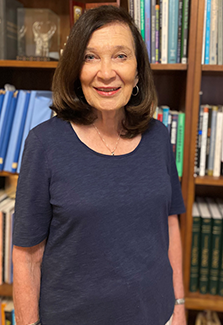Using sociology to tackle AIDS in Indonesia
July / August 2022 | Volume 21 Number 4
 Courtesy of Dr. Judith Levy Dr. Judith Levy
Courtesy of Dr. Judith Levy Dr. Judith Levy
Dr. Judith Levy is Associate Professor Emerita in Health Policy and Administration at University of Illinois in Chicago (UIC) and Director of the Fogarty UIC/Atma Jaya Catholic University Training Program in Advanced Research Methods and Translational Science. She earned a Ph.D. in Sociology from Northwestern University. Her pioneering work in HIV/AIDS research over the last four decades has appeared in prestigious journals and publications.
Q & A with Dr. Judith Levy
Why sociology, why global health research?
A central question of sociology asks: How and why do people come together collaboratively to form cities, communities, neighborhoods, and extended families? My research extends these questions to explore community-based models, peer prevention strategies, and culturally acceptable norms to promote and reinforce safer sex and drug practices within key populations and across their social networks.
As to why global health research, I grew up on the islands of Maui and Oahu in pre-state Hawaii. The islands’ rich cultural heritage and blending of many ethnic and racial populations greatly influenced the tenor and direction of my research. Also, at the start of the AIDS pandemic, I participated on the advisory team that WHO convened to develop what were then the first guidelines for studying HIV risk behavior in multiple countries. The natural next step was to conduct my own international research while encouraging others to do so.
Why is it important to study HIV in Indonesia?
HIV incidence continues to climb in many regions of Indonesia. The country has many talented clinicians and university faculty capable of leading and conducting effective HIV research that could inform public policy, prevention, and clinical practice. They just need the advanced theoretical and methodological skills to do so. Fogarty-sponsored training provides that.
My own research in Indonesia has benefited greatly from UIC’s long history of HIV research and interventions within the archipelago. Building on these established relationships, in 2003, my colleagues at UIC and Atma Jaya Catholic University (AJCU) in Jakarta and I received funding from the World AIDS Foundation to conduct HIV prevention workshops in four Indonesian cities. Other projects and studies, including an
AIDS International Training and Research (AITRP) grant and my current
Fogarty training program in HIV translational science, grew from there.
Tell us about your accomplishments in Indonesia.
For nearly 23 years, I directed the UIC AIDS International Training and Research Program (the UIC-AITRP) with six universities in four countries: Indonesia, Chile, Malawi, and China. The program included short-term and MPH degrees, yet we also graduated 23 Ph.D. students, among them nine Indonesians. When our AITRP trainees returned to their countries, they trained the next generation of HIV investigators. They also persuaded scientists and faculty from their home institutions to join them in AIDS research.
In Indonesia, returning UIC-AITRP trainees founded AIDS research programs at both AJCU and the College of Nursing, University of Indonesia. Later, Professor Irwanto, our first postdoc, partnered with me to successfully develop AJCU’s existing AIDS research program into an AIDS Research Center (ARC) serving faculty, students, and researchers across the archipelago. Based on ARC’s success— buttressed by continuing Fogarty training and capacity-building—Dr. Evi Sukmaningrum, who earned her doctorate as a UIC-AITRP trainee, spearheaded the effort to have ARC formally designated a “Center of Excellence” in research and training by the Indonesian Ministry of Education and Culture. This designation recognizes ARC’s contributions to AIDS research in health policy and social innovation.
What’s ahead for you?
Papua New Guinea has the highest rates of HIV infection in Indonesia. Prevention efforts among indigenous populations have little success due to geographic, socioeconomic, and cultural barriers. Through NIAID funding, Drs. Robert Bailey (UIC), Ignatius Praptoraharjo (AJCU/ARC), and I are partnering with the Papua indigenous community to develop and pilot a voluntary, indigenous model of medical male circumcision. This one-time prevention method is well-suited for a population that cannot consistently access prevention supplies and distrusts outside efforts to promote safer behavior.
A second project involves a Tajikistan/UIC partnership that is conducting a NIAID-funded clinical trial to test the effectiveness of a peer prevention model for HIV. The model we developed is designed to reduce drug and sexual HIV risk behaviors among social networks of Tajik labor migrants who inject drugs while working in Moscow. The pilot study and first half of the clinical trial have shown positive results. If success continues, the model could be culturally adapted and tested for use in Indonesia where drug use fuels the epidemic.
What surprises you about the research you do?
I've always been surprised that so many people are willing to discuss the most intimate aspects of their sexual behavior with strangers! I remember my first HIV study back in the late 80s here in Chicago at the start of the U.S. epidemic. Sampling was conducted through random digit dialing in Chicago. Staff trained on children's toy phones to practice talking comfortably and without a judgmental tone. We had to use words and discuss behaviors with total strangers that, rarely, were mentioned in that era, even in private.
We found early in this study that we could ask people all about their sexual behavior and they would tell us, but they would hang up as soon as we asked, What's your annual salary? So, we moved that item to the end of the survey. That way at least our sexual behavior questions got answered and if we didn't know how much money they made, well, okay, we could live with that.
More Information
Updated August 11, 2022
To view Adobe PDF files,
download current, free accessible plug-ins from Adobe's website.
Related Fogarty Programs
Related World Regions / Countries
Related Global Health Research Topics